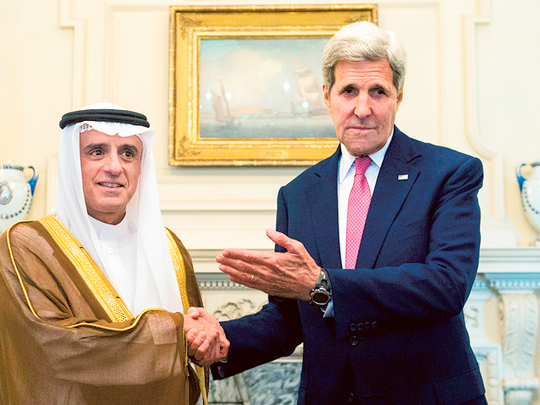
Washington: US President Barack Obama will host Saudi Arabia’s King Salman in their first and long-delayed White House summit Friday, with clashing views on Middle Eastern crises coming to the fore.
Salman’s inaugural visit as king — originally scheduled for May and cancelled by Riyadh — has been billed as a way of reinforcing US-Saudi relations.
But behind public statements of partnership, the meeting looks likely to be dominated by disagreements on Syria and Yemen as well as lingering doubts about the nuclear deal with Iran.
Saudi Arabia publicly voiced tepid support for the Iran deal, but privately expressed grave misgivings that the nuclear agreement may legitimise their arch-foe Iran.
Obama has now won enough votes to push the deal through Congress, easing the need for public Saudi endorsement.
“This is an important visit at an important time with the many developments in the region where we have a shared interest with Saudi Arabia and with the recent conclusion of the Iran deal, and the follow up on the Camp David summit with Saudi Arabia and our other Gulf partners,” Ben Rhodes, Deputy National Security Advisor, told reporters on Wednesday.
“This visit will be an opportunity for the president to follow up on the progress we’re making on the Camp David agenda, to discuss the Iran deal, and also our efforts to push back against malign Iranian activities in the region, but also, of course, to discuss a full range of regional issues,” Rhodes said.
But the White House would still like to assuage Saudi concerns that the deal equates to turning a blind eye to Iran’s activities.
These meetings normally end in “some kind of public statement that puts as positive a spin as possible on the meeting”, said Anthony Cordesman of the Center for Strategic and International Studies.
‘Common view’
This meeting “is unlikely to be an exception,” he said. “Both nations are close strategic partners in spite of their differences, and both states need each other.”
Differences over Iran have exacerbated tensions between the United States and Saudi Arabia over the crises in Syria and Yemen.
In Syria, the White House wants to make sure both countries “have a common view” on which Syrian opposition groups get support, according to senior Obama foreign policy aide Ben Rhodes.
“We are looking to isolate more extremist elements of the opposition, that’s been an ongoing conversation with Saudi Arabia,” he said.
Jeff Prescott, senior director for the Middle East at the National Security Council, said that Obama and Salman are likely to talk about the Iranian nuclear deal.
“We’ve obviously been consulting closely with our partners in Saudi Arabia throughout this process and have appreciated their expressions of support for the Joint Comprehensive Plan of Action [JCPOA] and our effort to address Iran’s nuclear programme,” Prescott said.
“The two leaders will discuss ways to continue to promote security in the region, including by coordinating more closely to address Iran’s destabilising activities in the region,” he added.
Responding to a question, Rhodes said that Saudi Arabia has concerns about Iran’s behaviour in the region.
“We understand that they have concerns about what Iran could do as their economy may perhaps improve along with sanctions relief. We also acknowledge the fact that we need to ensure that we’re doing everything we can to counter Iran’s destabilising activities in the region,” Rhodes added.
“There’s always a risk that Iran could spend funds on those nefarious activities,” he said.
Rhodes said Saudi Arabia has significant relationships in Iraq that can be utilised to support the ongoing effort against Daesh.












